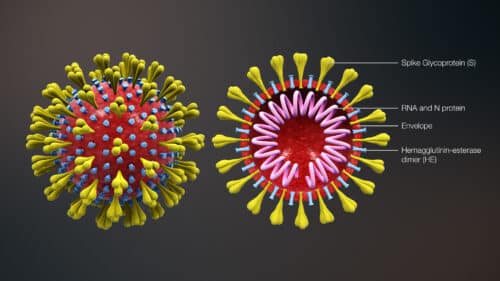IBM invites every person in the world who has a computer with an Internet connection to contribute to the fight against the corona virus. How do you donate? Download an application that utilizes the personal computer's resources when it is not in use to perform calculations that help researchers sort chemical compounds that may later become a drug

IBM has announced that anyone in the world who has a computer with an Internet connection can volunteer it to help scientists search for chemical compounds that may become a cure for the coronavirus. Computers that will participate in the research will perform simulations and calculations in order to identify and sort chemical compounds, including those of existing drugs, that may later be used as treatments against the virus.
To participate in the project, you must download an application that runs on the computer when it is not in use or in light use. From that moment, the process is automatic and the volunteers do not need any special technical knowledge or expertise: the application runs in the background without interfering and without slowing down the computer's operations. The personal information from the computer is not transferred to any other party and the software cannot enter personal or business files and does not harm the volunteers' privacy.
The application assigns computing tasks to each computer connected to the network and then returns completed calculations to the researchers, all through IBM's cloud. The project, called "OpenPandemic - COVID-19" will be able to easily perform hundreds of millions of calculations needed for simulations on thousands of chemical compounds. These simulations will allow scientists to accelerate the discovery of new drugs or a new use of existing drugs, instead of traditional research processes in the laboratory that usually take many months. The compounds that will show the potential to become an effective treatment against the corona virus will undergo more in-depth tests by experts.
The project, designed and conducted under the leadership of Scripps Research, is hosted on IBM's World Community Grid. This community is considered a reliable computing resource provided to researchers and scientists free of charge through crowd sourcing. As with other World Community Grid projects, the data generated from this effort will be made publicly available.
"IBM's World Community Grid is a resource that, in addition to making computing power available to scientists so they can accelerate and expand their vital work, empowers volunteers and allows them to join forces with others around the world and make a difference," said Guillermo Miranda, Vice President and Director of Corporate Social Responsibility of IBM. "At a time when we are required to keep our distance from each other and stay in isolation, the sense of common purpose and cohesion is more important than ever."
The OpenPandemic - COVID-19 project on World Community Grid joins other resources that IBM has recently made available to researchers battling the coronavirus. Among other things, the company established a partnership with the White House and a series of laboratories, academic institutions and technology companies to make the computing power of 16 supercomputers available to researchers. One of these computers called Summit, which is the most powerful supercomputer in the world, has already been used by researchers at the Oak Ridge National Laboratory and the University of Tennessee to identify 77 chemical compounds from a pool of 8,000 compounds that have the potential to fight the virus.
World Community Grid is a corporate responsibility initiative of IBM and part of a long-standing effort provided at no cost to scientists who need massive computing power to research humanitarian issues. World Community Grid's software allows people to use their computers as normal without affecting data safety or speed.
To date, more than 77,000 people and 450 organizations have joined the initiative. The donation amounts to nearly two million years of computing power and supports 30 research projects, including studies on cancer, Ebola, Zika, malaria and AIDS, as well as projects that aim to develop improved systems for filtering water and accumulating solar energy. Data from World Community Grid projects are always submitted to the public domain. To date, more than 50 medical peer-reviewed scientific articles have been published. Computing power is granted free of charge through crowdsourcing and allows researchers to expand research, test new research approaches and speed up processes.
Although the project is currently focused on COVID-19, Scripps Research also plans to develop tools and methods that will enable the discovery and rapid development of new drugs, for example during other global epidemics. "Scripps Research is grateful to IBM for hosting our World Community Grid project," said Dr. Stefano Forelli, assistant professor in the Department of Integrative, Structural, and Computational Biology at Scripps Research, who is leading the project. "Leveraging the unused processing power of thousands of computers around the world gives us incredible computing power to filter millions of chemical compounds. Our joint effort with volunteers from all over the world will accelerate the research of potential drugs against existing and future biological threats, whether it is COVID-19 or a completely different pathogen."
• To join the project click here
• Learn more about the Scripps Research project through the World Community Grid

4 תגובות
There is also the Folding@Home project that you didn't mention and allows you to contribute processing power to protein folding simulations of the virus.
Someone wants to mine bitcoins for free
What is the food additive?
A solution to Corona already exists and is being implemented in Indonesia, Singapore and Armenia.
This is a food supplement that does not require a medical prescription.
It proves its effectiveness without question.
The bureaucracy and the medical ego prevent its widespread use.
I use it.